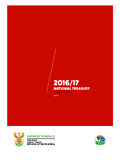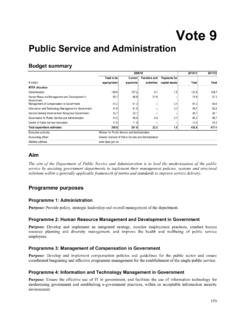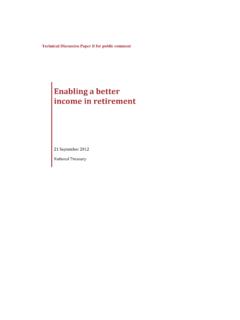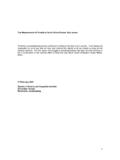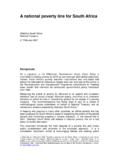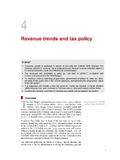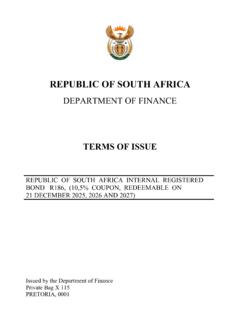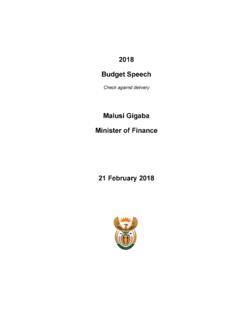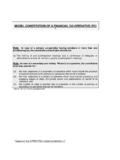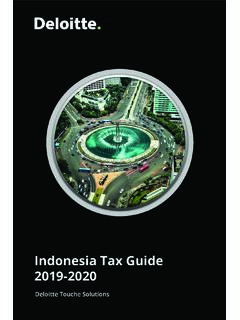Transcription of GUIDE TO CAPITAL GAINS TAX - National Treasury
1 1 GUIDE TO CAPITAL GAINS TAXThis GUIDE is intended to outline, in very broad terms, the key principles that areenvisaged to form part of the proposed CAPITAL GAINS tax (CGT) legislation in SouthAfrica. Comments by interested parties in respect of this GUIDE and the principles itsets out, as well as any other issues pertaining to CGT, are invited before 31 March2000. Correspondence should be addressed to: CAPITAL GAINS TaxCommissioner for the South African Revenue Box 402 Pretoria0001 Alternatively, comments may be e-mailed inquiries in respect of CGT may be directed to the contact personnel listed onpages 32 and 33. An up to date list of frequently asked questions and their answerswill also be available at SARS Online and the Department of Finance s web sitelocated at: : Foreign Assistance ProgramPretoria 23 February 20002 INDEXT opic Page1.
2 INTRODUCTION 4a) Why are we introducing a CGT? 4b) What are the economic issues in respect of introducing CGT? 5c) What does all this mean to you the taxpayer? 52. CHARACTERISTICS OF CGT 7a) Who is liable to pay CGT? 7b) What are affected CAPITAL assets? 8c) What is included in the base cost of an affected CAPITAL asset? 8 Acquisition costs 8 Incidental costs of acquisition and disposal 8 CAPITAL costs of maintaining title or rights to the asset 9 Improvement / enhancement costs 9 VAT 9d) When is CGT triggered? 10e) What will be exempted?11 A primary / principal owner-occupied residence 11 Private motor vehicles 11 Personal belongings and effects 11 Lump sum benefits superannuation & life assurance policies 12 Compensation for personal injury, illness, or defamation 12 Betting, lotteries & competitions 12 Foreign legal tender for personal use 12 GAINS or losses made by foreign government agencies 12 Small-business assets, where proceeds are used for retirement 12 Institutions fully exempt from normal taxation 12f) Rollover (deferral) of certain CAPITAL GAINS ?
3 12 Transfers between members of wholly owned groups 13 Transfers by up to 5 persons to a Company or CC 13 Transfers of business assets to a Company, for at least 20% 13 Transfers of property from a deceased estate to heirs 13 Donations of property to a donee 13 Transfers between spouses 133 Transfers rationalisation, unbundling, reorganisation etc. 13 Involuntary disposals 13 Business asset disposal and re-investment 13g) How are CAPITAL GAINS / losses determined? 14h) Are there any anti-avoidance measures? 16i) What if an affected asset is acquired before the effective date? 17j) Is there any relief on the inclusion of a CAPITAL gain in taxable income?21k) What other issues might be of concern?22 Unit trusts / property unit trusts 22 Long-term insurers 22 Retirement funds tax 22 Disposal of shares 22 Consideration (payment) due after the time of disposal 24 Cancelled transactions 25 Forfeiture of a deposit 26 Part-disposals of CAPITAL assets 26 Depreciable assets 27l) What records need to be kept?
4 29m) What are the administrative procedures for CGT? 313. CONTACT PERSONNEL At the South African Revenue Service 324. FLOWCHART Simplified overview of the CGT process3441. INTRODUCTIONa) Why are we introducing a CGT?The absence of a CGT creates many distortions in the economy, byencouraging taxpayers to convert otherwise taxable income into tax-freecapital GAINS . The South African Revenue Service has observed thatsophisticated taxpayers have engaged in these conversion transactions, therebyeroding the corporate and individual income tax bases. This erosion reducesthe efficiency and equity of the overall tax system. A CGT is, therefore, acritical element of any income tax system as it protects the integrity of thepersonal and corporate income tax bases and can materially assist inimproving tax CGT was introduced in the United Kingdom in 1965, the followingnoteworthy comments were made.
5 The failure to tax CAPITAL GAINS is widely regarded .. as the greatest blot onour existing system of direct taxation. There is little dispute nowadays thatcapital GAINS confer much the same kind of benefit on the recipient as taxedearnings more hardly won. Yet earnings pay tax in full while CAPITAL GAINS gofree. This is unfair to the wage earner. It has in the past been one of thebarriers to the progress of an effective incomes policy .. Moreover, there isno doubt that the present immunity from tax of CAPITAL GAINS has given apowerful incentive to the skillful manipulator of which he has taken fulladvantage to avoid tax by various devices which turn what is really taxableincome into tax-free CAPITAL GAINS . The Carter Commission s recommendations in 1966 in respect of theCanadian tax system and CGT state; A dollar gained through the sale of a share, bond or piece of real propertybestows exactly the same economic power as a dollar gained throughemployment or operating a business.
6 Internationally, the idea of such a tax is not uncommon, with many of ourtrading partners having implemented CGT decades question of the introduction of a CGT is also not new in the South Africancontext, as various Tax Commissions have considered its Franzsen Commission in 1969 proposed a limited form of CGT onimmovable property and marketable securities. The majority recommendationof the Margo Commission in 1986 was that CAPITAL GAINS should not besubjected to tax. The Katz Commission, on the other hand, acknowledged thecase for a tax on CAPITAL GAINS , while recommending that it should not beimplemented due to its complexity and the capacity of the tax administrationat that time (1995).5In view of the benefits CGT offers and the enhanced administrative capacityof SARS, the time is now right for Government to implement a , this step could give rise to many difficulties and,consequently, it is proposed that the tax will only become effective from1 April 2001.
7 In the interim, further research and consultation will take legislation will also be made available for comment prior to the finalimplementation of ) What are the economic issues in respect of introducing CGT?The impact of CGT on investment in the economy, both from domestic andforeign sources, was raised as far back as the Franzsen Commission in some commentators raise concerns regarding the effects of CGT oncapital formation, risk taking, and investment preferences, it should be bornein mind that CGT is widely accepted internationally. The impact upon the South African economy will be managed by the judiciouschoice of options with regard to effective date, base cost (opening values ofcapital assets), exemptions, rollover (deferral) relief, relief available on assetsacquired before the effective date, inclusion rate relief and rate aspects are spelt out later in this GUIDE .
8 A further factor that shouldlessen economic distortion is relative certainty in respect of the principles orcharacteristics of CGT and hence, the reason for this GUIDE s ) What does all this mean to you the taxpayer?Until the implementation or effective date, you will still be taxed on theincome you earn from owning assets, but will not generally be taxed on profitsarising from the disposal of those assets. For example, you will be taxed onincome such as rent and interest but not on the profits from selling yourshares, property or other investments, unless you acquired such assets with theintention of disposing of them in a scheme of the effective date this will change. All CAPITAL GAINS or losses made onthe disposal of CAPITAL assets will be subject to CGT unless excluded byspecific provisions.
9 However, where an asset was acquired before the effectivedate and disposed of thereafter, tax will only be payable on the CAPITAL gainwhich accrued after the effective date. The tax to be paid will be reducedfurther in all cases by only including a percentage of the gain in order to have some understanding of the characteristics of the proposedCGT in South Africa, it is appropriate to commence with a diagram reflectingthe basic framework of CGT, as well as a simple example, before the issuesare discussed in any detail. A flowchart of the CGT process may be found onpage framework of CGTCGT event (disposal or deemed disposal)Exemptions or rollover (deferral relief)Apply time-based apportionment or value assets held on the effective dateTest for R1,000 per annum primary exclusion (natural persons only)Inclusion rate reliefLegal person Tax return Natural person 50%25% inclusion of inclusion of realised gain realised gain(Companies etc.)
10 (Individuals)Example 1An individual taxpayer paying tax at the maximum marginal rate of 42%acquired shares listed on the JSE for investment purposes 6 months after theimplementation of CGT for R10,000 and disposed of all those shares 2 yearslater for R12,000. Assuming that the taxpayer was not considered to be atrader in shares, that this was the taxpayer s only CAPITAL asset disposal for theyear and that there were no changes to the tax rate over this period, how wouldCGT work? Is the asset on revenue account? No, therefore the CAPITAL gain falls within the CGT regime rather than thenormal income tax regime. Did a CGT event occur? Yes, the shares were disposed of, ownership changed. Does an exemption or rollover (deferral) relief apply?

